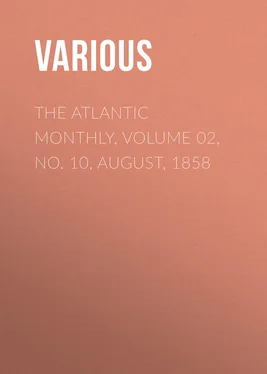There are certain times of the day, as well as certain seasons of the year, when the birds are most musical. The grand concert of the feathered tribe takes place during the hour between dawn and sunrise. During the remainder of the day they sing less in concert, though many species are very musical at noonday, and seem, like the nocturnal birds, to prefer the hour when others are silent. At sunset there is an apparent attempt to unite once more in chorus, but this is far from being so loud or so general as in the morning. The little birds which I have classed in the fourth division are a very important accompaniment to the anthem of dawn, their notes, though short, serving agreeably to fill up the pauses made by the other musicians. Thus, the hair-bird ( Fringilla Socialis ) has a sharp and trilling note, without any modulation, and not at all melodious, when heard alone; but in the morning it is the chief harmonizer of the whole chorus, and serves, more than any other voice, to give unity and symphony to the multitude of miscellaneous parts.
There are not many birds whose notes could be accurately described upon the gamut. The nearest approach we can make to accuracy is to give some general idea of their time and modulation. Their musical intervals can be distinguished but with difficulty, on account of the rapidity of their utterance. I have often attempted to transcribe some of their notes upon the musical scale, but I am persuaded that such sketches can be only approximations to literal correctness. As different individuals of the same species sing very differently, the notes, as transcribed from the song of one individual, will never exactly represent the song of another. If we listen attentively, however, to a number of songs, we shall detect in all of them a theme
Конец ознакомительного фрагмента.
Текст предоставлен ООО «ЛитРес».
Прочитайте эту книгу целиком, купив полную легальную версию на ЛитРес.
Безопасно оплатить книгу можно банковской картой Visa, MasterCard, Maestro, со счета мобильного телефона, с платежного терминала, в салоне МТС или Связной, через PayPal, WebMoney, Яндекс.Деньги, QIWI Кошелек, бонусными картами или другим удобным Вам способом.
SPENSER: Faery Queen . See also the Two Cantos of Mutability, Cant. VII.:–
"That old Dan Geffrey, in whose gentle spright
The pure well-head of poesie did dwell."
MILTON: Il Penseroso.
WORDSWORTH: Poems of Later Years .
CHAUCER: Clerke's Tale , Prologue.
WARTON: Ode on his Majesty's Birthday, 1787
Tyrwhitt's Chaucer: Historical Notes on his Life.
Masque of the Fortunate Islands
History of English Poetry , Vol. II. pp. 335-336, ed. 1840.
WARTON: Birthday Ode , 1787.
See his British Poets, from Chaucer to Jonson , Art. Daniel . Southey contemplated a continuation of Warton's History , and, in preparing for that labor, learned many things he had never known of the earlier writers.
Jonson's classification. See his Poetaster .
Lamb's Works, and Life , by Talfourd, Vol. IV. p. 89.
Hesperides, Encomiastic Verses .
Herrick, ubi supra. --To the haunts here named must be added the celebrated Mermaid , of which Shakspeare was the Magnus Apollo , and The Devil , where Pope imagines Ben to have gathered peculiar inspiration:– "And each true Briton is to Ben so civil, He swears the Muses met him at The Devil ." Imitation of Horace , Bk. ii. Epist. i.
Election of a Poet-Laureate , 1719, Works, Vol. II.
Feast of the Poets , 1814.
Fable for Critics , 1850.
This story rests on the authority of Thomas Betterton, the actor, who received it from Davenant.
Dedication of the Pastorals of Virgil, to Hugh, Lord Clifford, the son of Sir Thomas.
There were some indications that portions of the farce had been written while Davenant was living and had been intended for him. Mr. Bayes appears in one place with a plaster on his nose, an evident allusion to Davenant's loss of that feature. In a lively satire of the time, by Richard Duke, it is asserted that Villiers was occupied with the composition of The Rehearsal from the Restoration down to the day of its production on the stage:–
"But with playhouses, wars, immortal wars,
He waged, and ten years' rage produced a farce.
As many rolling years he did employ,
And hands almost as many, to destroy
Heroic rhyme, as Greece to ruin Troy.
Once more, says Fame, for battle he prepares,
And threatens rhymers with a second farce:
But, if as long for this as that we stay,
He'll finish Clevedon sooner than his play."
The Review
It is little to the credit of Dryden, that, having saved up his wrath against Flecknoe so long, he had not reserved it altogether. Flecknoe had been dead at least four years when the satire appeared.
Macaulay quotes Blackmore's Prince Arthur , to illustrate Dryden's dependence upon Dorset:–
"The poets' nation did obsequious wait
For the kind dole divided at his gate.
Laurus among the meagre crowd appeared,
An old, revolted, unbelieving bard,
Who thronged, and shoved, and pressed, and would be heard.
"Sakil's high roof, the Muse's palace, rung
With endless cries, and endless songs he sung.
To bless good Sakil Laurus would be first;
But Sakil's prince and Sakil's God he curst.
Sakil without distinction threw his bread,
Despised the flatterer, but the poet fed."
Laurus , of course, stands for Dryden, and Sakil for Dorset.
The Squire of Alsatia is said to have realized him £130.
An Allusion to the Tenth Satire of the First Book of Horace .–The word "censure" will, of course, be understood to mean judgment , not condemnation .
Imitation of Horace , Bk. ii. Epist. i.
See the History of England , Vol. IV., Chapter 17, for reference to Shadwell's Volunteers .
History of England , Chapter 19.












